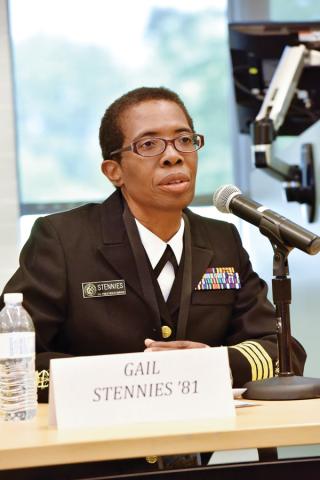Making Health Care a Top Priority
These professionals advocate for accessibility, affordability, and community involvement.
Q: What health care issues should our communities be addressing?
And what should a Mawrter be advocating for? Speaking at a Women of Color in Medicine panel, four Bryn Mawr health professionals weighed in.
Gail Stennies ’81, M.D., M.P.H.
How does the average bear navigate the U.S. health system? We have to encourage people who may not have the resources or the health literacy to understand it. Encourage them to ask questions, bring somebody else with them to their appointments, ask the doctor.
It can seem that medicine is becoming formulaic or driven by other stakeholders. So, as consumers or deliverers of healthcare, we need to speak up. We have to be our own advocate and help other people advocate—not just for individual patient care, but also for broader health and wellness services and options. Something like Flint, Michigan’s water contamination should never have happened.
Catharyn Turner ’91, M.Ed., M.D., F.A.A.P.
I would advocate for a true single-payer system so that everyone’s needs could be met. The United States spent $3.2 trillion on healthcare in 2015 alone. There’s no reason we can’t cover everyone.
I took several humanities courses in medical school—one can do that now in some schools—and I learned a great deal about the history of single-payer systems throughout the world. During the Great Depression, the idea of a single payer system was raised in the U.S. as well, but it didn’t happen. One reason is that a single-payer system would have had to cover everyone, including Jews and Blacks. Our country's refusal to embrace universal health care is embedded in racism. It didn’t happen because some just didn’t think all deserved it, and special interests, i.e. doctors and insurance companies, have continued to fight to keep healthcare a premium instead of a basic human right.
Rita Louard ’76, M.D.
What I would like to see is that, when we look at the twin epidemics of obesity and diabetes, we don’t look for the solution from the medical community alone. We need to have government involved. We need to have schools involved. We need to have churches involved. We need to have communities involved.
I want to see more communication and partnerships addressing some of the chronic diseases that we face.
Nakiya Showell ’03, M.D., M.H.S., M.P.H.
We need continued policies to foster healthier environments. So many children, families, and adults live in environments that are poisonous to their health. If anyone—a child, an adult, a family—goes outside and there is no place to play, to walk, to feel safe, how can we expect them to walk, jog, or run around a track? If there is no place close by to get healthier food, how can we expect anyone to eat five servings of fruits and vegetables every day?
We need to work as a society, not put all the ownership on individuals. This is on us—not just the medical community—to change the environments that people live in.
Gail Stennies ’81, M.D., M.P.H., a 23-year veteran of the Centers for Disease Control and Prevention, has devoted her career to public and population health. A senior advisor working on building capacity for emergency preparedness and response among health departments, she previously advised the President’s Malaria Initiative on reducing malaria-related morbidity and mortality in sub-Saharan Africa.
Catharyn A. Turner, II ’91, M.Ed., M.D., F.A.A.P., is an attending psychiatrist in child and adolescent psychiatry as well as a general pediatrician providing primary care to adolescents at the Children’s Hospital of Philadelphia.
Rita Louard ’76, M.D., is an associate professor of internal medicine at Albert Einstein College of Medicine and director of the Clinical Diabetes Program at Montefiore Medical Center in New York City. She is involved in clinical endocrinology, particularly diabetes, and educational programs for students, residents, and fellows.
Nakiya Showell ’03, M.D., M.H.S., M.P.H., is an assistant professor of pediatrics at Johns Hopkins University School of Medicine. Her research focuses on eliminating child obesity disparities, with the goal to develop interventions that address obesity disparities among low-income and minority children.
Published on: 09/16/2017
